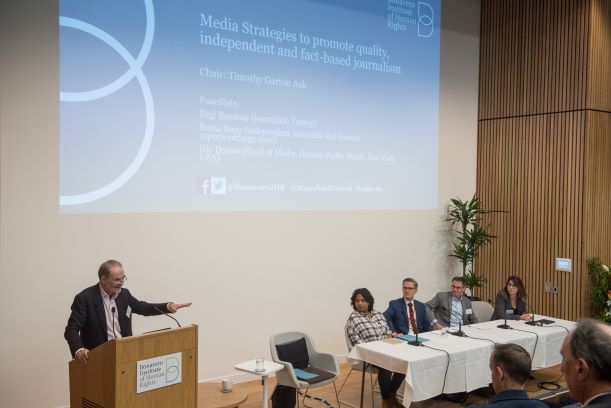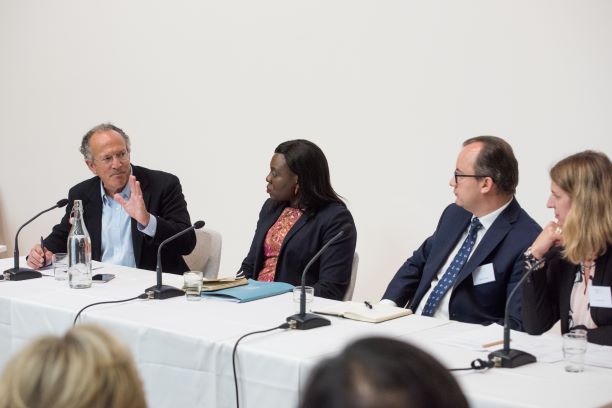Confronting Illiberalism - Panel Discussion Write-ups
DPhil candidates, Anneloes Hoff and Lisa Hsin, summarise the panel discussions on Media Strategies and Civil Society Strategies.
Flagship Events at the Bonavero Institute
Media Strategies to Confront Illiberalism
By Anneloes Hoff

L-R Timothy Garton Ash, Soma Basu,Rasmus Kleis Nielsen, Nic Dawes and Ezgi Başaran.
In the face of growing illiberalism, what strategies can the media adopt to promote quality, independent and fact-based journalism? This question was central to the first panel, which was chaired by Timothy Garton Ash, Professor of European Studies at St Antony’s College. Turkish journalist Ezgi Basaran, Indian journalist Soma Basu, Nic Dawes of Human Rights Watch, and Rasmus Kleis Nielsen of the Reuters Institute for the Study of Journalism at the University of Oxford shared their insights how illiberal regimes restrict the freedom of the press, and contemplated ways of fighting this.
Across the world, the panellists observed, increasingly illiberal governments are putting pressure on independent reporting by attempting to control the media, from Turkey, Hungary and Poland to Trump’s US and Brexit Britain. This often starts, as Nic Dawes had experienced as a journalist in apartheid South Africa, with litigation and legislation to restrict journalists from publishing. Other common strategies for media control the panellists identified were crony ownership of media outlets (making censorship redundant), and harassment of journalists – from personal defamatory attacks on journalists and self-motivated and organised online trolling, to jailing and even killing journalists.
Media delivery and the way people access the news have changed radically in recent years. Most people, Rasmus Kleis Nielsen explained, now get their news digitally, and often indirectly through social media or search engines. Verification of the reliability of news sources has become harder, making manipulative misinformation and ‘fake news’ easy to spread, and leading to polarising ‘echo chambers’, ‘filter bubbles’, and more general sense of cyber-pessimism and even -fatalism, Timothy Garton Ash said.
How should the media respond? The strategies the panel identified fall in three broad categories. First of all, trust. The trust of the public in the media is very low, Ezgi Basaran and Soma Basu observed. Soma Basaran asked why people see journalists as part of the untrustworthy elite, although no journalist she knew could even make a simple living out of journalism. Would it be because journalists traditionally hold close relations with power-holders? Or their power as gatekeepers of the public’s access to the news? She called for scrutiny and critical self-reflection to guarantee high-quality independent reporting. How can journalism help people be informed? Are journalists as good at listening as they are at publishing?
The views of the panellists on the most appropriate way for high-end media to respond to the rise of authoritarianism varied. Timothy Garton Ash noted how the strict impartiality of certain US media got lost after Trump’s election. This is not in conflict with the core values of high quality reporting, Nic Dawes argued, as such reporting will naturally change when the rise of illiberalism involves the politicization of the very idea of journalism.
A second set of strategies focused on the economic dimension. The panellists discussed promoting high-quality journalism through subscriptions and paywalls, funding by not-for-profit foundations, and public broadcasting, as well as different ownership models for media outlets. Thirdly, the panel discussed the regulatory dimension. Regulation of the press in order to limit misinformation should be centred on a respect for rights and the health of the public sphere, in order to make sure that it does not shut down anything uncomfortable. The panellists also identified the complex role and responsibility of the companies behind social media platforms. This goes beyond data regulation: due diligence should also be exercised in, for instance, Facebook design features (which could optimize for hate speech), or the analysis of metadata for ‘encrypted’ online harassment on WhatsApp.
Although the panel painted a very dark picture of the state of independent journalism under the rise of illiberalism, it also highlighted optimistically that amazing independent journalism is being done all across the world, even under the most difficult circumstances. At a time in which the notion of truth itself is under attack, the panellists concluded, journalists need to be committed to the truth. The media’s task of providing the public access to an unbiased truth is more important than ever
Civil Society Strategies to Protect and Promote Human Rights in Illiberal Contexts
by Lisa Hsin

L-R Chris Stone, Osai Ojigho, Adam Bodnar, Annelen Micus
The panel on Civil Society Strategies to protect and promote human rights in illiberal contexts featured Osai Ojigho of Amnesty International Nigeria, Adam Bodnar, the Ombud, Poland and Dr. Annelen Micus of the Bonavero Institute of Human Rights. The session was chaired by Chris Stone of the Bonavero Institute Advisory Board, who is also an independent advisor on justice reform, organisational strategy, and innovation in the social sector. The panel spoke from personal experiences as human rights advocates in Nigeria, Poland and Colombia (respectively).
Together, they described a ‘shrinking’ space for civil society organisations and outlined a plethora of strategies that contributes to a ‘climate of harassment’ towards human rights defenders, designed to derail civil society initiatives and distract civil societies from investigating human rights breaches. From assassinations, death threats, and criminal prosecutions to paid protests, surveillance and online smear campaigns, the attacks originate from a range of sources, including organisations with counter human rights ideologies, the state, and the military. But, as Dr Micus explained, strength and assistance can be drawn from the international community, humanitarian community, formal international instruments, constitutionally enshrined rights, and trusted allies within governments.
In this hostile environment, Osai Ojigho said focus and careful planning are vital, and most crucially, civil society strategy must adhere to objective facts, and commit to the people whose stories are being told. The challenge for human rights activists is to bridge abstract concepts of human rights with the realities of life. To do so, Adam Bodnar suggested creative measures such as highlighting the historical significance of civil societies and the strategic use of symbolic iconography can be effective. Most importantly, listening to complaints, engaging in discussions with those affected by human rights violations remains one of the best ways to effect change.
There is no doubt from the panel’s discussion that many challenges lie ahead for human rights defenders and civil society organisations, but as Chris Stone pointed out, when the state trembled, as it seems to be in so many places around the world, we look to civil society organisations to uphold human rights. The health and welfare of civil society organisations is therefore key to confronting illiberalism around the world today, and in the future.
